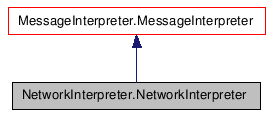NetworkInterpreter.NetworkInterpreter Class Reference
Detailed Description
NetworkInterpreter handles the network messages like starting a server, connecting and disconnecting to and from a server, etc.
#include
<class_network_interpreter_1_1_network_interpreter.h>

Public Member Functions |
|
| __init__ () | |
| deactivate () | |
| Abstract - to be implemented by the
subclasses. |
|
| APPLICATION_LOAD_PREFERENCES () | |
| Interprets all preferences related to host
and client connection ports and names. |
|
| QUIT () | |
| On quit, disconnect as a server or a client
first. |
|
| START_SERVER () | |
| Start the hosting server within the current
session. |
|
| END_SERVER () | |
| Kill the server associated with this
session. |
|
| SERVER_STATUS () | |
| If the server startup fails we'll get a
status message saying it's not running. |
|
| CONNECT_TO_SERVER () | |
| Connect a current session to a passed
server. |
|
| DISCONNECT_FROM_SERVER () | |
| Disconnect this session from the server.
|
|
| CLIENT_CONNECTION_STATUS () | |
| ENABLE_NETWORK_TRACE () | |
| Enable the logging of network activities.
|
|
Member Function Documentation
| NetworkInterpreter.NetworkInterpreter.__init__ | ( | ) |
Reimplemented from MessageInterpreter.MessageInterpreter.
| NetworkInterpreter.NetworkInterpreter.deactivate | ( | ) |
Abstract - to be implemented by the subclasses.
Performs the operations necessary to place this interpreter into a passive state. Ensure that this base class implementation is called by the subclass implementation.
Reimplemented from MessageInterpreter.MessageInterpreter.
| NetworkInterpreter.NetworkInterpreter.APPLICATION_LOAD_PREFERENCES | ( | ) |
Interprets all preferences related to host and client connection ports and names.
| NetworkInterpreter.NetworkInterpreter.QUIT | ( | ) |
On quit, disconnect as a server or a client first.
It may not be as important to disconnect as a client, but may as well be consistent.
| NetworkInterpreter.NetworkInterpreter.START_SERVER | ( | ) |
Start the hosting server within the current session.
Push a server interpreter onto the interpreter stack.
Message data arguments: sessionName - name of the session. machineName - name of the host machine. port - port on which to start the server.
| NetworkInterpreter.NetworkInterpreter.END_SERVER | ( | ) |
| NetworkInterpreter.NetworkInterpreter.SERVER_STATUS | ( | ) |
If the server startup fails we'll get a status message saying it's not running.
We should call __stopServer just to handle this case so that the ServerInterpreter will be removed.
| NetworkInterpreter.NetworkInterpreter.CONNECT_TO_SERVER | ( | ) |
Connect a current session to a passed server.
This session becomes a client of the server.
Message data arguments: host - the name of the machine where the server runs. port - port on which to connect to the server.
| NetworkInterpreter.NetworkInterpreter.DISCONNECT_FROM_SERVER | ( | ) |
Disconnect this session from the server.
| NetworkInterpreter.NetworkInterpreter.CLIENT_CONNECTION_STATUS | ( | ) |
| NetworkInterpreter.NetworkInterpreter.ENABLE_NETWORK_TRACE | ( | ) |
Enable the logging of network activities.
